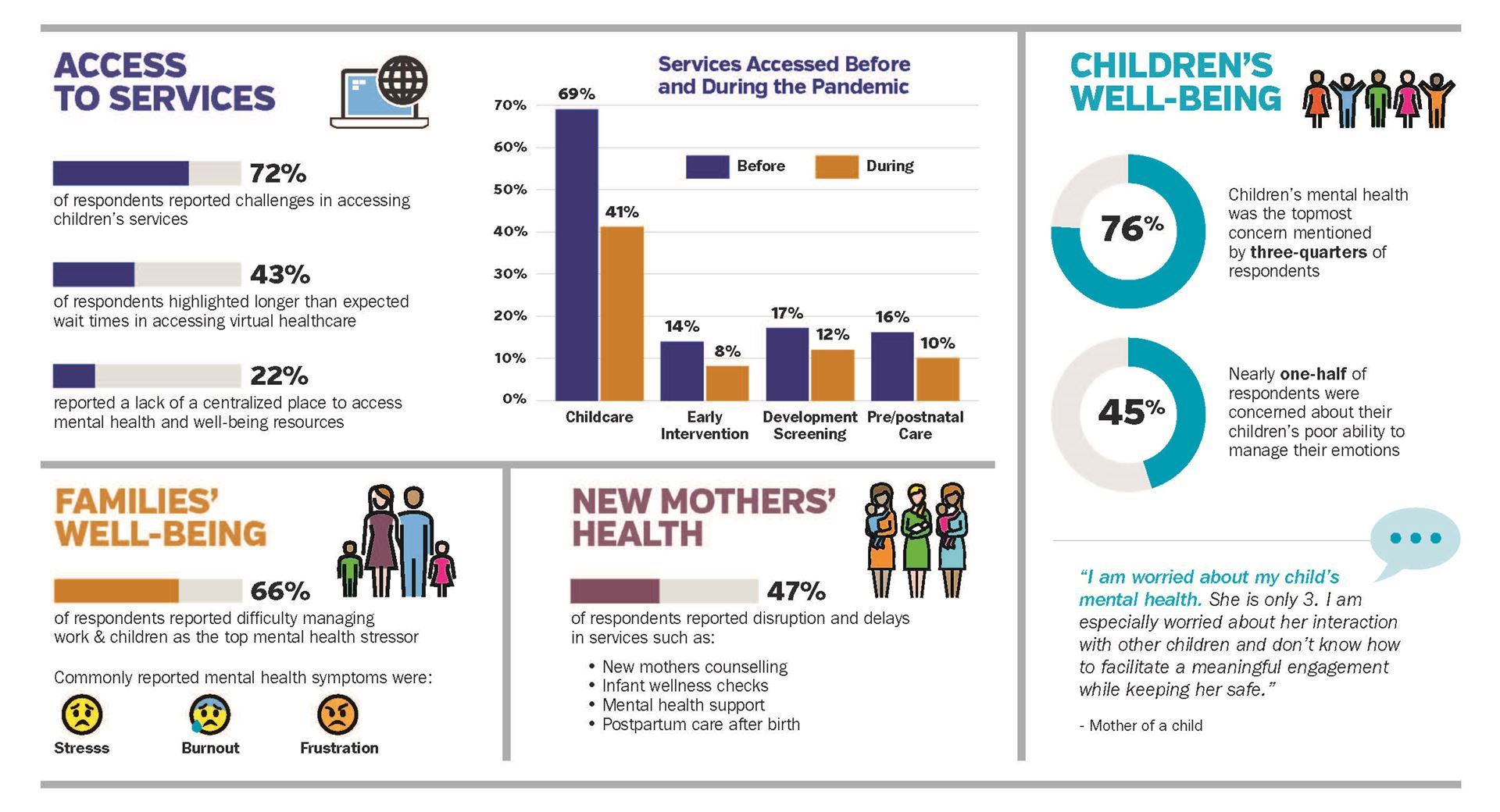- Home
- Research & Innovation
- Access to Infant and Early Mental Health Services During COVID-19
Access to Infant and Early Mental Health Services During COVID-19
Last update: March 2022
Introduction
“If I'm not ok, my kids aren't ok. Post-partum depression help was virtually nonexistent. My counselling stopped because I wasn't allowed to go in-person and there is zero chance of getting an hour to myself with 4 kids.”
In winter 2020, IEMHP observed that many services to infants, toddlers and young children and their families were decreased or stopped in the efforts to respond to the global COVID-19 pandemic. How would this affect families? In coordination with the Knowledge Institute on Child and Youth Mental Health and Addictions, Kids Brain Health Network, and Children First in Windsor, ON, IEMHP undertook a brief survey of Canadian parents/caregivers of children under 6 years of age on their experiences with accessing services during the first wave of the pandemic. Over 2,000 responses were received.
The results revealed that many families with very young children:
- grappled to meet the sudden and unreasonable expectation of handling major life changes, their job and their child’s care,
- struggled to access the resources and support they direly needed, and
- experienced higher levels of stress and saw their mental wellbeing decrease dramatically, which, research shows, can directly affect an infant or a young child’s mental wellbeing and development.
These observations have led us and our collaborators to take action by releasing a policy brief that will equip policy and decision-makers with the knowledge they need to ensure consistent support remains available to children and their families in the future.
Method
Parents/caregivers of children under 6 years of age across Canada were invited to answer a short, bilingual, online survey. They were asked about how child and youth mental health systems can improve the quality of services for young children throughout the COVID-19 pandemic, and specifically:
- What information or services they accessed during the COVID-19 pandemic, in order to support their youngest child's wellbeing; and
- How the quality of this information and services could be improved, as the pandemic went on.
Outcomes
The survey remained open for three weeks and 2,000 families responded.
Increased expectations and lack of information and support
“It is challenging and unrealistic to ask a parent to choose to work, care for a child and educate them all at the same time.”
Results revealed that families struggled with finding information and support to care for their young children during the pandemic, and frequently had to cope with unrealistic expectations of both working and providing care for their children while their formal and informal supports were no longer accessible. In many instances, the absence of these supports was a major source of stress for families of very young children.
Unanswered concerns for child development
“The lack of resources and consideration for young children and their caregivers has been extremely difficult for both, and I worry the impact will be felt long after the pandemic ends.”
Over 75% of respondents identified at least 3 topic areas where more information would have helped them. In addition, respondents expressed deep concern about their young child’s development and wellbeing, and the lack of information about long-term consequences. Caregivers also reported being worried about how their own mental health issues might be affecting their child’s development.
Reluctance to resume services
“I just need more support for my child’s care (I have family support, but we’re all burnt out at this point), and there aren’t any options that don’t involve a significant risk of infection.”
At least 30% of respondents indicated that they do not intend to resume crucial services for their young child’s development and mental health once these services resume. Among these families, many report difficulties making an informed decision because of the lack of targeted information about COVID-19 risks versus the benefits of the service.
Downloadable Documents:
- Infographic: Caring for Infants, Toddlers and Pre-Schoolers During Covid-19 (PDF, English)
- Full Report: Caring for Infants, Toddlers and Pre-Schoolers During Covid-19 (PDF, English)
- Policy Brief: Impacts of the COVID-19 Pandemic on Young Children and their Families (PDF, English)
- Infographie: Prendre soin des nourrissons, des tout-petits et des enfants d'âge préscolaire durant la pandémie de COVID-19 (PDF, français)
- Rapport complet: Prendre soin des nourrissons, des tout-petits et des enfants d'âge préscolaire durant la pandémie de COVID-19 (PDF, français)
- Exposé de politique: Les répercussions de la pandémie de COVID-19 sur les jeunes enfants et leur famille (PDF, français)
